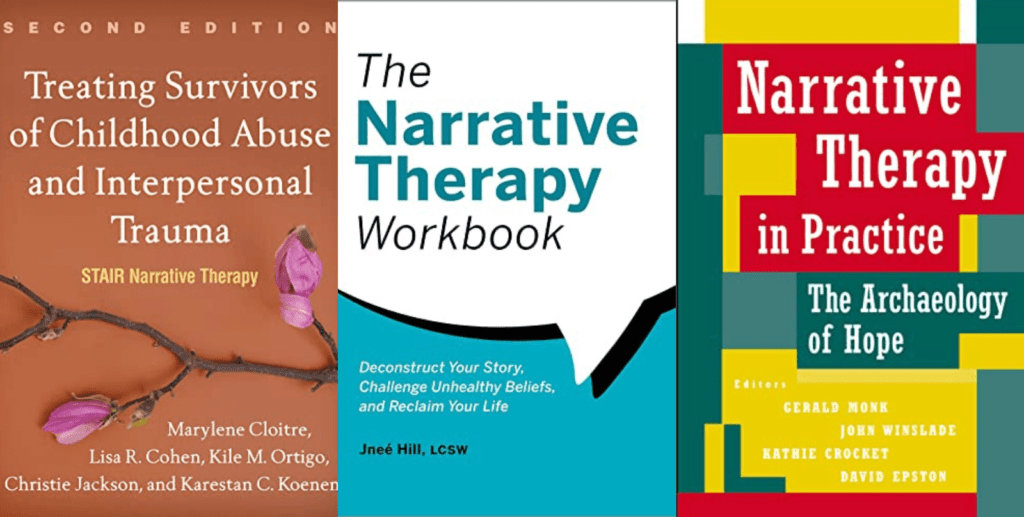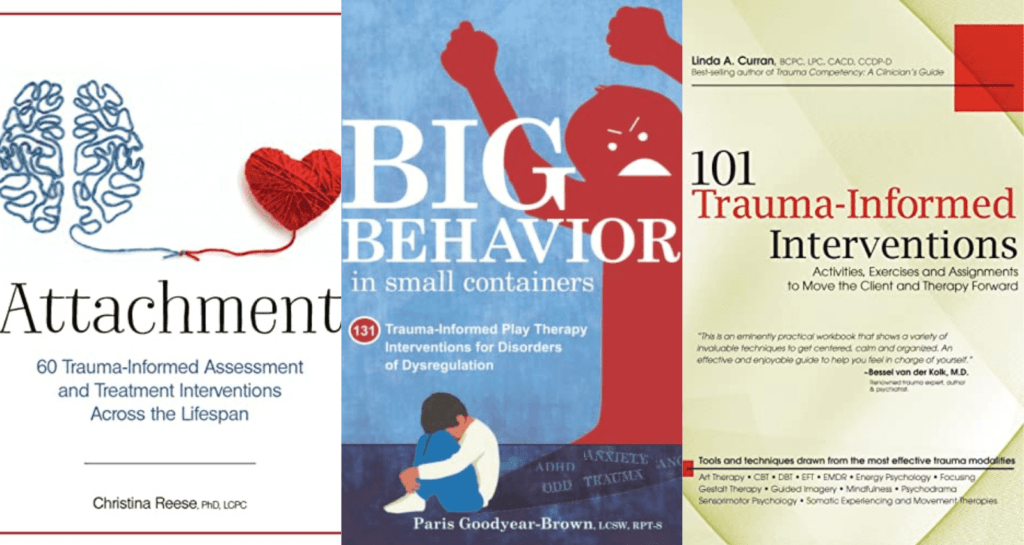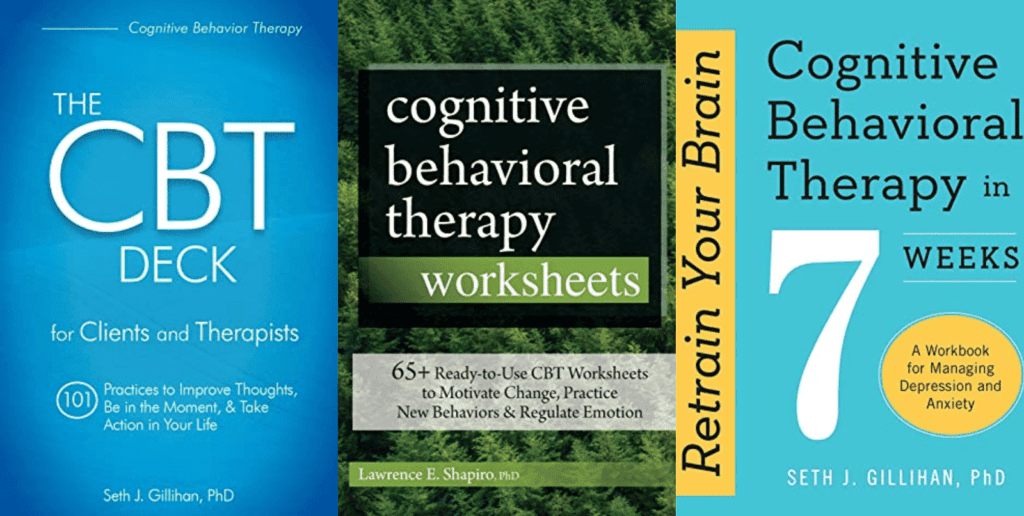The following are some of the best narrative therapy books.
- Narrative Therapy
- Narrative Therapy Books
- 1. What is narrative therapy?
- 2. The Narrative Therapy Workbook
- 3. Retelling the Stories of Our Lives
- 4. Narrative Therapy
- 5. Treating Survivors of Childhood Abuse and Interpersonal Trauma
- 6. Solution Focused Narrative Therapy
- 7. Narrative Exposure Therapy
- 8. Narrative Therapy (Theories of Psychotherapy Series®)
- 9. Narrative Therapy in Practice
- 10. Neuro-Narrative Therapy
- Benefits of Narrative Therapy
- Conclusion
Disclosure: Some of the links below are affiliate links. This means that, at zero cost to you, I will earn an affiliate commission if you click through the link and finalize a purchase.
Narrative Therapy
Narrative therapy is a form of therapy that helps the individual externalize and deconstruct their issues by separating the individual from their problem
The techniques involved aim to help the individual focus less on blame and labels and view themselves as the expert on their life.
Simply put, Narrative Therapy helps you examine the stories you’ve been told and the stories you tell yourself. It also places you in the driver’s seat to re-author your own story, while highlighting strengths and areas of growth within your story.
Narrative Therapy Books

1. What is narrative therapy?
By Alice Morgan
This best-selling book is an easy-to-read introduction to the ideas and practices of narrative therapy. It uses accessible language, has a concise structure and includes a wide range of practical examples.
What Is Narrative Practice? covers a broad spectrum of narrative practices including externalisation, re-membering, therapeutic letter writing, rituals, leagues, reflecting teams and much more.
Related: CBT Worksheets Bundle (FREE PFD Download)

2. The Narrative Therapy Workbook
By Jneé Hill LCSW
Using this Narrative Therapy workbook, you’ll learn to examine those stories and rewrite them to reflect the life you want to live.
- An empowering tool—Learn about Narrative Therapy, its origins, and how your narratives can shape who you are.
- Flip your story—Match your narrative to who and what you want to be with a wide range of strategies, exercises, and practices.
- Inspire positive change—Build your new stories through reflective prompts and uplifting affirmations. The pen is in your hand, and you can write the next chapter!
Related: Best 10 CBT Therapy Books

3. Retelling the Stories of Our Lives
By David Denborough
Filled with relatable examples, useful exercises, and informative illustrations, Retelling the Stories of Our Lives leads readers on a path to reclaim their past and re-envision their future.
Readers are introduced to key ideas of narrative practice like the externalizing problems – ‘the person is not the problem, the problem is the problem’ -and the concept of “re-membering” one’s life.
Related: FREE CBT Triangle Worksheet PDF Download

4. Narrative Therapy
By Gene Combs, Jill Freedman
For psychotherapy students, teachers, and practitioners, this book describes the clinical application of the growing body of ideas and practices that has come to be known as narrative therapy. Clear and compelling demonstrations of narrative therapy practice, rich in case examples and creative strategies, are at the heart of this book.
Related: FREE Therapy Journal Template

5. Treating Survivors of Childhood Abuse and Interpersonal Trauma
By Marylene Cloitre, Lisa R. Cohen, Kile M. Ortigo, Christie Jackson, Karestan C. Koenen
Skills Training in Affective and Interpersonal Regulation (STAIR) Narrative Therapy helps clients to build crucial social and emotional resources for living in the present and to break the hold of traumatic memories. Highly clinician friendly, the book provides everything needed to implement STAIR–including 68 reproducible handouts and session plans–and explains the approach’s theoretical and empirical bases.
Related: Healing Isn’t Linear: What Does It Mean?

6. Solution Focused Narrative Therapy
By Linda Metcalf PhD LPC-S LMFT-S CSC
This groundbreaking book is the first to provide a comprehensive model for effectively blending the two main postmodern brief therapy approaches: solution focused and narrative therapies. It harnesses the power of both models—the strengths-based, problem-solving approach of SFT and the value-honoring and re-descriptive approach of narrative therapy—to offer brief, effective help to clients that builds on their strengths and abilities to envision and craft preferred outcomes.
Related: Best 9 Nonfiction Books About Mental Health

7. Narrative Exposure Therapy
By Maggie Schauer, Frank Neuner, Thomas Elbert
The new edition of the clearly structured and easy-to-follow NET manual now includes the latest insights and new treatments for dissociation and social pain. The first part of the book describes the theoretical background. The second part shows how to use the NET approach step by step, with practical advice and tools, including how to deal with special issues (such as dealing with challenging moments, defense mechanisms for the therapist, and ethical issues). Appendices include an informed consent form, and checklists for the therapist.
Related: Best 10 Books On Self Love And Healing

8. Narrative Therapy (Theories of Psychotherapy Series®)
By Stephen Madigan
This second edition of Narrative Therapy includes advice for working with highly conflicted couple relationships; innovative techniques for working with children, youth, and families; updated practice approaches to grief, loss, trauma, and death; ideas for understanding gender and the influence of queer‑informed narrative therapy on identity formation; and the use of narrative therapy in non‑Western cultural contexts.
Related: Best 10 Self Compassion Books

9. Narrative Therapy in Practice
By Gerald Monk, John Winslade, Kathie Crocket, David Epston
How to apply the definitive postmodern therapeutic technique in a variety of situations, including treating alcoholics, counseling students, treating male sexual abuse survivors, and more. Written with scholarship, energy, practicality, and awareness.
Related: Best 10 Self Discovery Books

10. Neuro-Narrative Therapy
By Jeffrey Zimmerman
For any therapist working in the area of Narrative Therapy, and for any interested in the emerging understandings that science is bringing to appreciating how our brains develop with and among each other, this book has something to offer. Combining the neuro- and the narrative, as Jeffrey Zimmerman has done here, will create a new direction in Narrative Therapy, one in which our brain and body work together, inviting a more direct and effective engagement with clients.

Benefits of Narrative Therapy
1. Externalization
One of the key concepts in narrative therapy is externalization, which involves separating the individual from the problem.
By externalizing the problem, individuals are better able to view it as something separate from themselves, reducing feelings of blame and shame.
This shift in perspective allows for a more objective examination of the problem and opens up possibilities for change.
2. Empowerment
Narrative therapy places a strong emphasis on empowering individuals.
It helps clients recognize their own strengths, abilities, and resources, which may have been overshadowed by the dominant problem narrative.
By highlighting these positive aspects, individuals gain a sense of agency and are more motivated to take steps towards change.
3. Deconstruction of problem-saturated stories
Narrative therapy aims to deconstruct problem-saturated stories and explore alternative, preferred stories.
It encourages individuals to challenge dominant narratives that may be limiting or oppressive and create new, more empowering stories.
This process facilitates personal growth and allows individuals to redefine their identity in a way that aligns with their values and aspirations.
Related: Best 23 Therapist Gifts Ideas
4. Cultivating resilience
Narrative therapy acknowledges the resilience individuals possess in coping with adversity.
It helps clients explore and recognize the skills, values, and beliefs that have supported them through difficult times.
By highlighting these qualities, narrative therapy reinforces resilience and assists individuals in navigating future challenges.
5. Collaboration and co-construction of meaning
Narrative therapy is a collaborative approach that encourages a therapeutic partnership between the therapist and client.
Together, they co-construct new meanings and understandings of the client’s experiences.
This collaborative process fosters a sense of trust, respect, and safety, allowing individuals to explore sensitive and complex issues more deeply.
Related: Top 100 Therapy Questions
6. Cultural sensitivity
Narrative therapy recognizes the influence of culture, society, and social systems on individuals’ lives and identities.
It acknowledges the impact of societal discourses and power structures on shaping individual narratives.
By taking cultural factors into account, narrative therapy promotes inclusivity and supports individuals in understanding how their stories are shaped and influenced by broader social contexts.
7. Validation of multiple perspectives
Narrative therapy values the diversity of perspectives individuals bring.
It acknowledges that there are often multiple interpretations and meanings associated with any given experience.
Through open dialogue and exploration, narrative therapy validates and affirms individuals’ unique viewpoints, helping them develop a rich, multidimensional understanding of their lives and relationships.
Related: Best 10 Acceptance And Commitment Therapy Books
8. Focus on strengths and alternative stories
Narrative therapy shifts the focus from deficits and problems to strengths and possibilities.
It encourages clients to identify and build upon their existing strengths, resources, and past successes.
By emphasizing alternative stories and exceptions to the dominant problem narrative, narrative therapy expands the range of possibilities and promotes hope and optimism.
9. Long-lasting effects
Narrative therapy aims to equip individuals with the skills and tools needed to continue their personal growth beyond therapy sessions.
By encouraging self-reflection, critical thinking, and introspection, narrative therapy provides individuals with the capacity to navigate future challenges and conflicts independently.
10. Application across various contexts
Narrative therapy’s flexibility and adaptability make it applicable across various contexts.
It has been successfully used in individual therapy, couples counseling, family therapy, and community work.
Its principles can be applied to a wide range of issues, including trauma, addiction, depression, anxiety, relationship difficulties, and personal development.
Conclusion
Narrative therapy offers numerous benefits to individuals seeking personal growth and positive change.
Its inclusive and culturally sensitive approach makes it a valuable therapeutic modality for a diverse range of clients and contexts.



